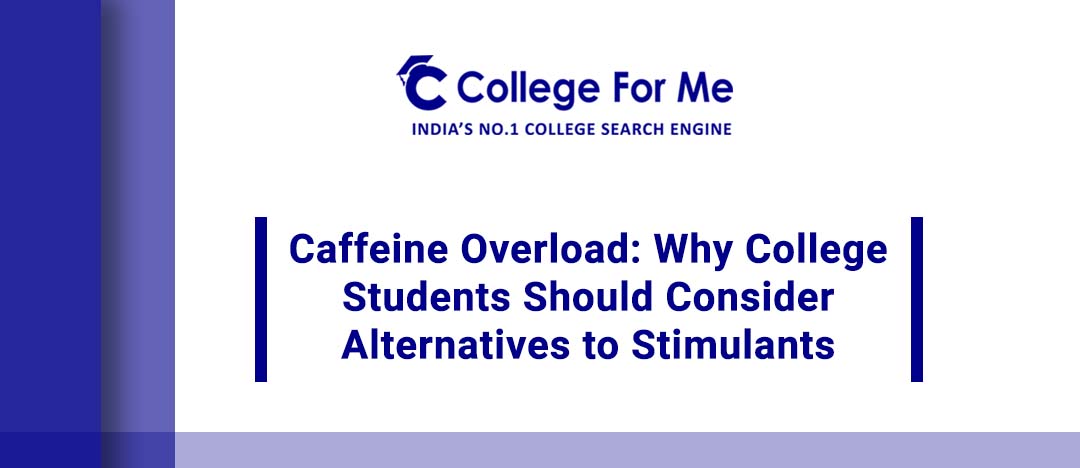Career Scopes Of A B.Tech. Student
There is a high demand for B.Tech. degree holders in the private sector, yet, there is also the opti...

College life is notorious for its demanding academic schedules, late-night study sessions, and the pressure to juggle numerous responsibilities. To cope with sleep deprivation and workload, many college students turn to caffeine as a quick and accessible energy boost. While caffeine may provide temporary relief, relying on it can lead to adverse effects on physical and mental health.
In this article, we explore the reasons why college students should consider alternatives to caffeine and adopt healthier lifestyle choices to maintain their well-being and academic performance.
1. Disrupting Sleep Patterns
One of the most significant drawbacks of caffeine consumption is its impact on sleep patterns. College students are already prone to irregular sleep schedules due to late-night studying and social activities. Adding caffeine into the mix further disrupts their circadian rhythm, leading to difficulty falling asleep, reduced sleep quality, and daytime drowsiness. These sleep disturbances can have detrimental effects on academic performance and overall health.
2. Dependency and Tolerance
Regular consumption of caffeine can lead to dependency and tolerance, wherein students may require increasing amounts to achieve the same stimulating effects. As tolerance builds, the risk of addiction becomes more pronounced, potentially leading to withdrawal symptoms when not consuming caffeine.
3. Negative Effects on Health
Excessive caffeine intake can lead to a range of negative health effects, including increased heart rate, elevated blood pressure, and digestive issues. Some individuals may experience anxiety, jitters, and restlessness, exacerbating stress levels and interfering with concentration and focus.
4. Dehydration
Caffeine is a diuretic, which means it increases urine production and can lead to dehydration. College students often lead busy lives and may not prioritize adequate hydration. Relying on caffeinated beverages instead of water can worsen dehydration and impact physical and cognitive performance.
5. Poor Nutrition Choices
In college environments, caffeinated beverages are frequently paired with unhealthy snacks or fast food. Regular consumption of sugary or high-calorie caffeinated drinks can contribute to poor nutrition choices, weight gain, and negative effects on overall health.
6. Stress and Anxiety Amplification
While caffeine can temporarily alleviate fatigue, it can also exacerbate stress and anxiety. College students are already susceptible to high levels of stress, and caffeine can intensify these feelings, leading to a cycle of dependence on stimulants to manage emotions.
7. Diminished Focus and Memory
Contrary to popular belief, caffeine may impair long-term memory and interfere with the consolidation of information. Students may experience difficulties in retaining information and recalling it during exams or important assignments.
Conclusion: While caffeine may seem like a tempting solution to the challenges of college life, it is essential for students to recognize the potential risks and consequences associated with its consumption. Instead of turning to caffeine for a quick energy boost, college students should consider healthier alternatives to maintain their well-being and academic performance.
Adopting good sleep habits, such as creating a consistent sleep schedule and managing time wisely, can significantly improve focus and cognitive abilities. Regular exercise, proper nutrition, and staying hydrated are vital components of a healthy lifestyle that can provide sustainable energy throughout the day.
Additionally, students can explore natural energy boosters like mindfulness practices, short breaks during study sessions, and engaging in activities they enjoy to reduce stress and recharge their minds.
By making conscious choices to prioritize their well-being and academic success, college students can navigate the demands of college life with vitality and resilience, without relying on caffeine's short-term benefits and long-term drawbacks.

There is a high demand for B.Tech. degree holders in the private sector, yet, there is also the opti...

If you are looking for a bright and prospective career, then getting a B.Tech. in CSE must be under ...
Comments (0)